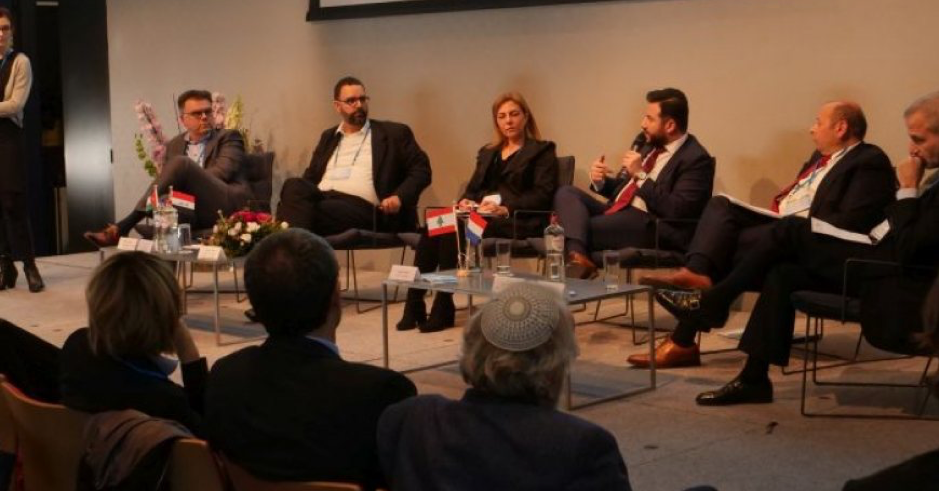
Berytech at the Planetary Security Conference
Private sector water scarcity is increasingly straining Iraq, Jordan and Lebanon. These stresses are exacerbated by refugees and conflicts, resulting in serious security risks. During the Planetary Security Conference, the Netherlands Water Partnership organized a workshop to bring together stakeholders from various sectors, from both Europe and the region itself. Among the speakers was Ramy Boujawdeh, deputy general manager of Berytech, a Lebanese initiative that provides support and growth to innovative and passionate entrepreneurs.
Boujawdeh participated in the workshop title Private Sector & Conflict-sensitive Climate Adaptation in the Middle East, which brought together stakeholders from various sectors, both from Europe and the region itself, to discuss good practices of partnerships to reduce environmental stresses in Iraq, Lebanon and Jordan. The intended outcomes of the workshop were to: Build bridges between research, policy and practical solutions; Develop ideas on innovative concepts of integral cooperation to counter environmental stresses; and Identify the high-potential areas and projects for integral cooperation and concrete action.
Water Crisis
“One of the major issues in Lebanon is poor water management and continuous availability. The Litani river, hugely important for the country’s agriculture, is heavily polluted by waste water from industries and from the many refugee camps. There are about 1.5 million refugees in Lebanon, making it the largest per capita population of refugees in the world. There is a lot of pressure on water quality and water distribution. Finding solutions is far from easy, as there are multiple stakeholders with conflicting interests. Water and crisis are tightly connected.
The water-energy-food nexus is crucial for the sustainable development of Lebanon, and innovation is essential to boost this development. When it comes to water management, more efficient irrigation techniques and improvement of the food production value chain is important. It is a major component of our Agrytech program.
Counteract brain drain
At Berytech, I lead the Incubation and Entrepreneurship Business Development arm that supports innovative Lebanese start-ups and SMEs. We want to support start-ups and give young people opportunities to develop and create valuable jobs for themselves and others. Through our programs we facilitate interaction with stakeholders during innovation weekends where the start-ups and young people can focus on pain points in specific sub-sectors and come up with solutions that are subsequently re-evaluated in partnership with the industry.
It is important to solve problems locally and to scale-up within the region. This is an absolute prerequisite for sustainable development. And it is also a way to counteract the brain drain we are suffering at the moment. We have to create the kind of jobs needed to attract capital and export products and services because that is what we need for economic growth. It doesn’t help when money just circulates within Lebanon itself.
Foreign partners
Foreign partners can play an important role in this process. For instance, we have built an active partnership with the Wageningen University StartLifeincubator and Food Valley, helping start-ups to scale-up and find their way into international markets.
I think the Planetary Security Conference, and the workshop in particular, has helped open the eyes of many stakeholders by looking at the challenges from different angles and thus putting the role of the private sector in perspective. The position of the government is quite weak, so donors often work directly with NGOs. It is essential to make the connection with the private sector. It is my firm belief that in our region, the private sector must be involved in mobilizing change to reduce the risk of an even bigger water crisis. If not, change will take a long time to happen. I sincerely hope the workshop will get a lot of fruitful follow-up. It was very inspiring, but of course it doesn’t stop here. Governments, NGOs, knowledge institutes and the private sector must continue to meet and work on innovative, integral and sustainable solutions together.”
Source: https://www.netherlandswaterpartnership.com/news/blog-private-sector-vital-reduce-water-crisis-risk-lebanon
The Planetary Security Initiative (PSI)
Climate change affects human security and can increase conflict risk. The Planetary Security Initiative (PSI) aims to catalyze action in affected contexts. PSI sets out best practice, strategic entry points and new approaches to reducing climate-related risks to conflict and stability, thus promoting sustainable peace in a changing climate. The Netherlands Ministry of Foreign Affairs launched the PSI in 2015.
The workshop on 20 February, organized by the Netherlands Water Partnership (NWP), brought together stakeholders from various sectors from Europe and from Iraq, Lebanon and Jordan to discuss good practice in partnerships to reduce environmental stresses in the region.
For more information, contact NWP’s Ruben Vermeer at r.vermeer@nwp.nl.







